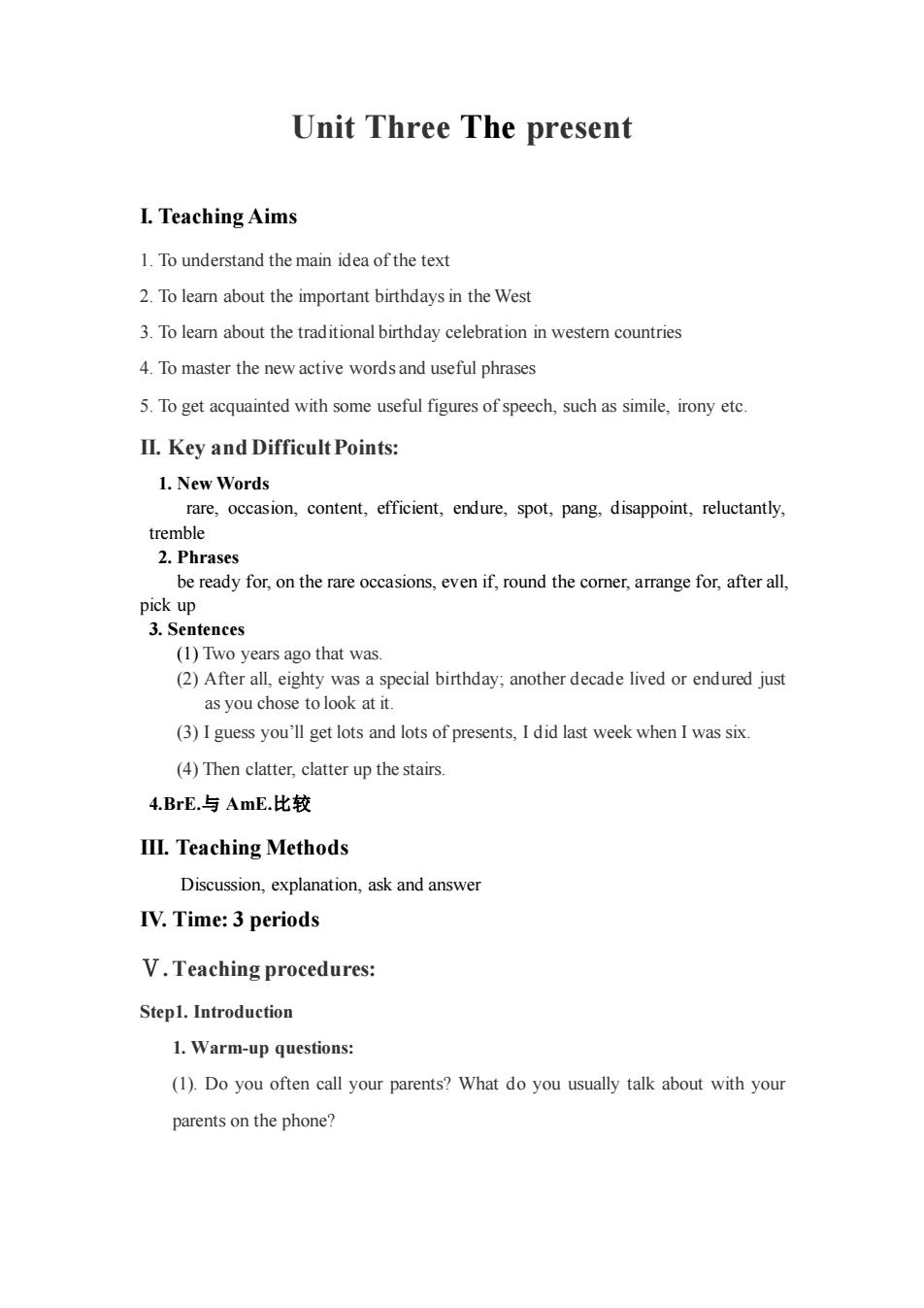
Unit Three The present I.Teaching Aims 1.To understand the main idea of the text 2.To leam about the important birthdays in the West 3.To leam about the traditional birthday celebration in westem countries 4.To master the new active words and useful phrases 5.To get acquainted with some useful figures of speech,such as simile,irony etc II.Key and Difficult Points: 1.New Words rare,occasion,content,efficient,endure,spot,pang,disappoint,reluctantly, tremble 2.Phrases be ready for,on the rare occasions,even if.round the comer,arrange for,after all. entences (1)Two years ago that was. (2)After all,eighty was a special birthday;another decade lived or endured just as you chose to look at it. (3)I guess you'll get lots and lots of presents,I did last week when I was six. (4)Then clatter,clatter up the stairs. 4.BrE.与AmE.比较 III.Teaching Methods Discussion,explanation,ask and answer IV.Time:3 periods V.Teaching procedures: Step1.Introduction 1.Warm-up questions: (1).Do you often call your parents?What do you usually talk about with your parents on the phone?
Unit Three The present I. Teaching Aims 1. To understand the main idea of the text 2. To learn about the important birthdays in the West 3. To learn about the traditional birthday celebration in western countries 4. To master the new active words and useful phrases 5. To get acquainted with some useful figures of speech, such as simile, irony etc. II. Key and Difficult Points: 1. New Words rare, occasion, content, efficient, endure, spot, pang, disappoint, reluctantly, tremble 2. Phrases be ready for, on the rare occasions, even if, round the corner, arrange for, after all, pick up 3. Sentences (1) Two years ago that was. (2) After all, eighty was a special birthday; another decade lived or endured just as you chose to look at it. (3) I guess you’ll get lots and lots of presents, I did last week when I was six. (4) Then clatter, clatter up the stairs. 4.BrE.与 AmE.比较 III. Teaching Methods Discussion, explanation, ask and answer IV. Time: 3 periods Ⅴ. Teaching procedures: Step1. Introduction 1. Warm-up questions: (1). Do you often call your parents? What do you usually talk about with your parents on the phone?
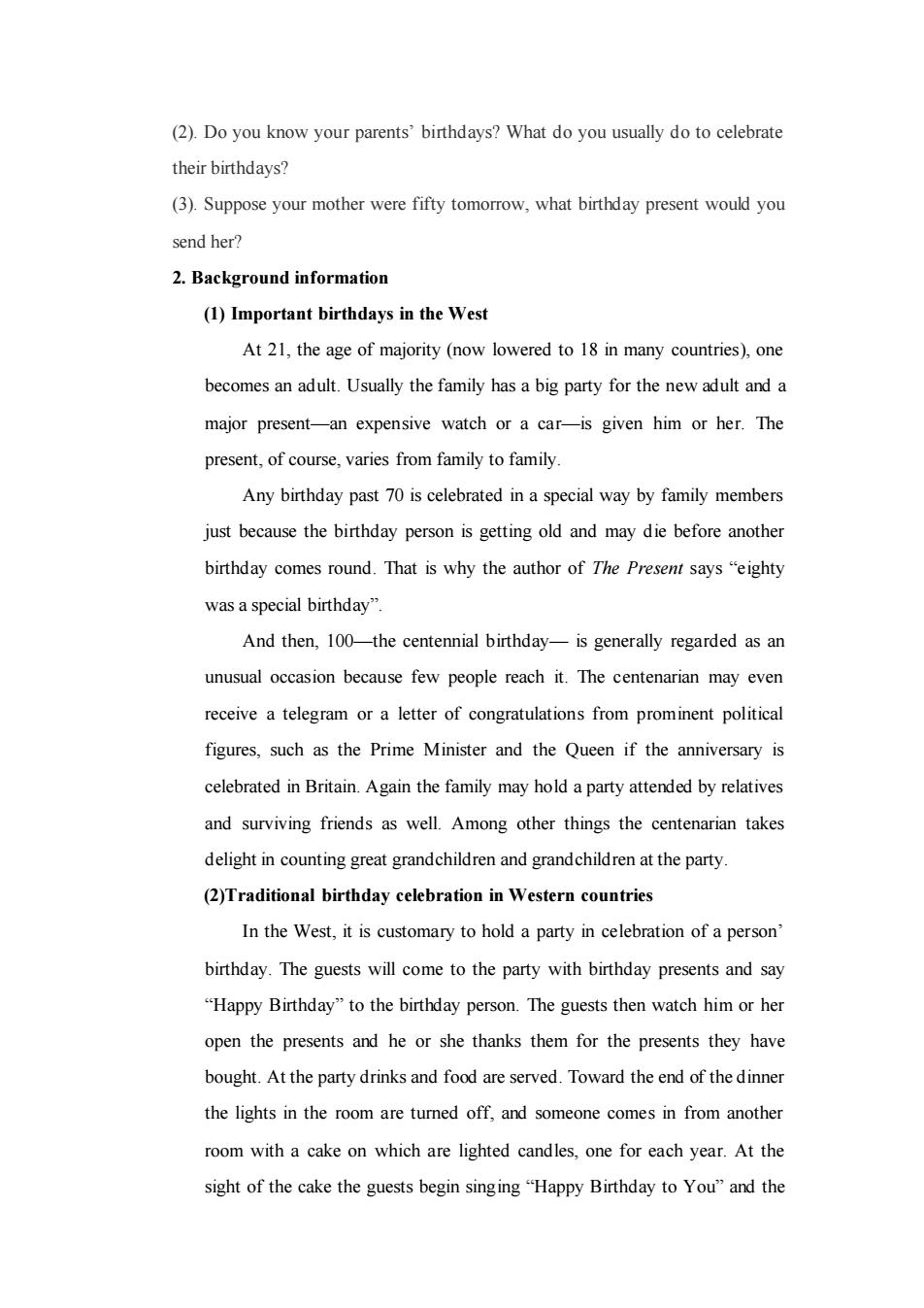
(2).Do you know your parents'birthdays?What do you usually do to celebrate their birthdays? (3).Suppose your mother were fifty tomorrow,what birthday present would you send her? 2.Background information (1)Important birthdays in the West At 21,the age of majority (now lowered to 18 in many countries),one becomes an adult.Usually the family has a big party for the new adult and a major present-an expensive watch or a car-is given him or her.The present,of course,varies from family to family Any birthday past 70 is celebrated in a special way by family members just because the birthday person is getting old and may die before another birthday comes round.That is why the author of The Present says"eighty was a special birthday” And then,100-the centennial birthday-is generally regarded as an unusual occasion because few people reach it.The centenarian may even receive a telegram or a letter of congratulations from prominent political figures,such as the Prime Minister and the Queen if the anniversary is celebrated in Britain.Again the family may hold a party attended by relatives and surviving friends as well.Among other things the centenarian takes delight in counting great grandchildren and grandchildren at the party (2)Traditional birthday celebration in Western countries In the West,it is customary to hold a party in celebration of a person' birthday.The guests will come to the party with birthday presents and say "Happy Birthday"to the birthday person.The guests then watch him or her open the presents and he or she thanks them for the presents they have bought.At the party drinks and food are served.Toward the end of the dinner the lights in the room are tumned off,and someone comes in from another room with a cake on which are lighted candles,one for each year.At the sight of the cake the guests begin singing"Happy Birthday to You"and the
(2). Do you know your parents’ birthdays? What do you usually do to celebrate their birthdays? (3). Suppose your mother were fifty tomorrow, what birthday present would you send her? 2. Background information (1) Important birthdays in the West At 21, the age of majority (now lowered to 18 in many countries), one becomes an adult. Usually the family has a big party for the new adult and a major present—an expensive watch or a car—is given him or her. The present, of course, varies from family to family. Any birthday past 70 is celebrated in a special way by family members just because the birthday person is getting old and may die before another birthday comes round. That is why the author of The Present says “eighty was a special birthday”. And then, 100—the centennial birthday— is generally regarded as an unusual occasion because few people reach it. The centenarian may even receive a telegram or a letter of congratulations from prominent political figures, such as the Prime Minister and the Queen if the anniversary is celebrated in Britain. Again the family may hold a party attended by relatives and surviving friends as well. Among other things the centenarian takes delight in counting great grandchildren and grandchildren at the party. (2)Traditional birthday celebration in Western countries In the West, it is customary to hold a party in celebration of a person’ birthday. The guests will come to the party with birthday presents and say “Happy Birthday” to the birthday person. The guests then watch him or her open the presents and he or she thanks them for the presents they have bought. At the party drinks and food are served. Toward the end of the dinner the lights in the room are turned off, and someone comes in from another room with a cake on which are lighted candles, one for each year. At the sight of the cake the guests begin singing “Happy Birthday to You” and the
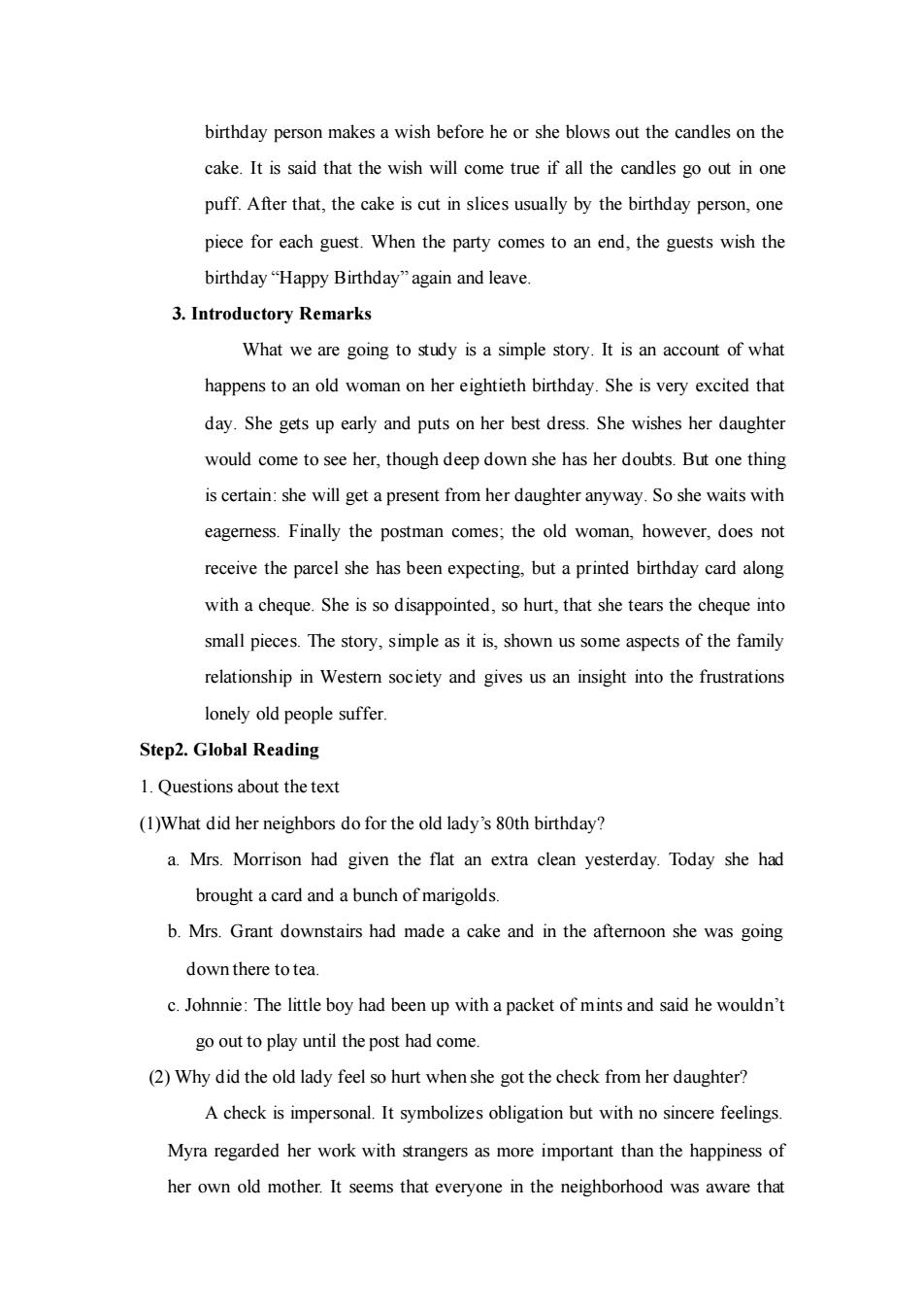
birthday person makes a wish before he or she blows out the candles on the cake.It is said that the wish will come true if all the candles go out in one puff.After that,the cake is cut in slices usually by the birthday person,one piece for each guest.When the party comes to an end,the guests wish the birthday“Happy Birthday”again and leave.. 3.Introductory Remarks What we are going to study is a simple story.It is an account of what happens to an old woman on her eightieth birthday.She is very excited that day.She gets up early and puts on her best dress.She wishes her daughter would come to see her,though deep down she has her doubts.But one thing is certain:she will get a present from her daughter anyway.So she waits with eagerness.Finally the postman comes;the old woman,however,does not receive the parcel she has been expecting,but a printed birthday card along with a cheque.She is so disappointed,so hurt,that she tears the cheque into small pieces.The story,simple as it is,shown us some aspects of the family relationship in Westem society and gives us an insight into the frustrations lonely old people suffer. Step2.Global Reading 1.Questions about the text (1)What did her neighbors do for the old lady's 80th birthday? a.Mrs.Morrison had given the flat an extra clean yesterday.Today she had brought a card and a bunch of marigolds b.Mrs.Grant downstairs had made a cake and in the aftemoon she was going down there to tea. c.Johnnie:The little boy had been up with a packet of mints and said he wouldn't go out to play until the post had come. (2)Why did the old lady feel so hurt when she got the check from her daughter? A check is impersonal.It symbolizes obligation but with no sincere feelings Myra regarded her work with strangers as more important than the happiness of her own old mother.It seems that everyone in the neighborhood was aware that
birthday person makes a wish before he or she blows out the candles on the cake. It is said that the wish will come true if all the candles go out in one puff. After that, the cake is cut in slices usually by the birthday person, one piece for each guest. When the party comes to an end, the guests wish the birthday “Happy Birthday” again and leave. 3. Introductory Remarks What we are going to study is a simple story. It is an account of what happens to an old woman on her eightieth birthday. She is very excited that day. She gets up early and puts on her best dress. She wishes her daughter would come to see her, though deep down she has her doubts. But one thing is certain: she will get a present from her daughter anyway. So she waits with eagerness. Finally the postman comes; the old woman, however, does not receive the parcel she has been expecting, but a printed birthday card along with a cheque. She is so disappointed, so hurt, that she tears the cheque into small pieces. The story, simple as it is, shown us some aspects of the family relationship in Western society and gives us an insight into the frustrations lonely old people suffer. Step2. Global Reading 1. Questions about the text (1)What did her neighbors do for the old lady’s 80th birthday? a. Mrs. Morrison had given the flat an extra clean yesterday. Today she had brought a card and a bunch of marigolds. b. Mrs. Grant downstairs had made a cake and in the afternoon she was going down there to tea. c. Johnnie: The little boy had been up with a packet of mints and said he wouldn’t go out to play until the post had come. (2) Why did the old lady feel so hurt when she got the check from her daughter? A check is impersonal. It symbolizes obligation but with no sincere feelings. Myra regarded her work with strangers as more important than the happiness of her own old mother. It seems that everyone in the neighborhood was aware that
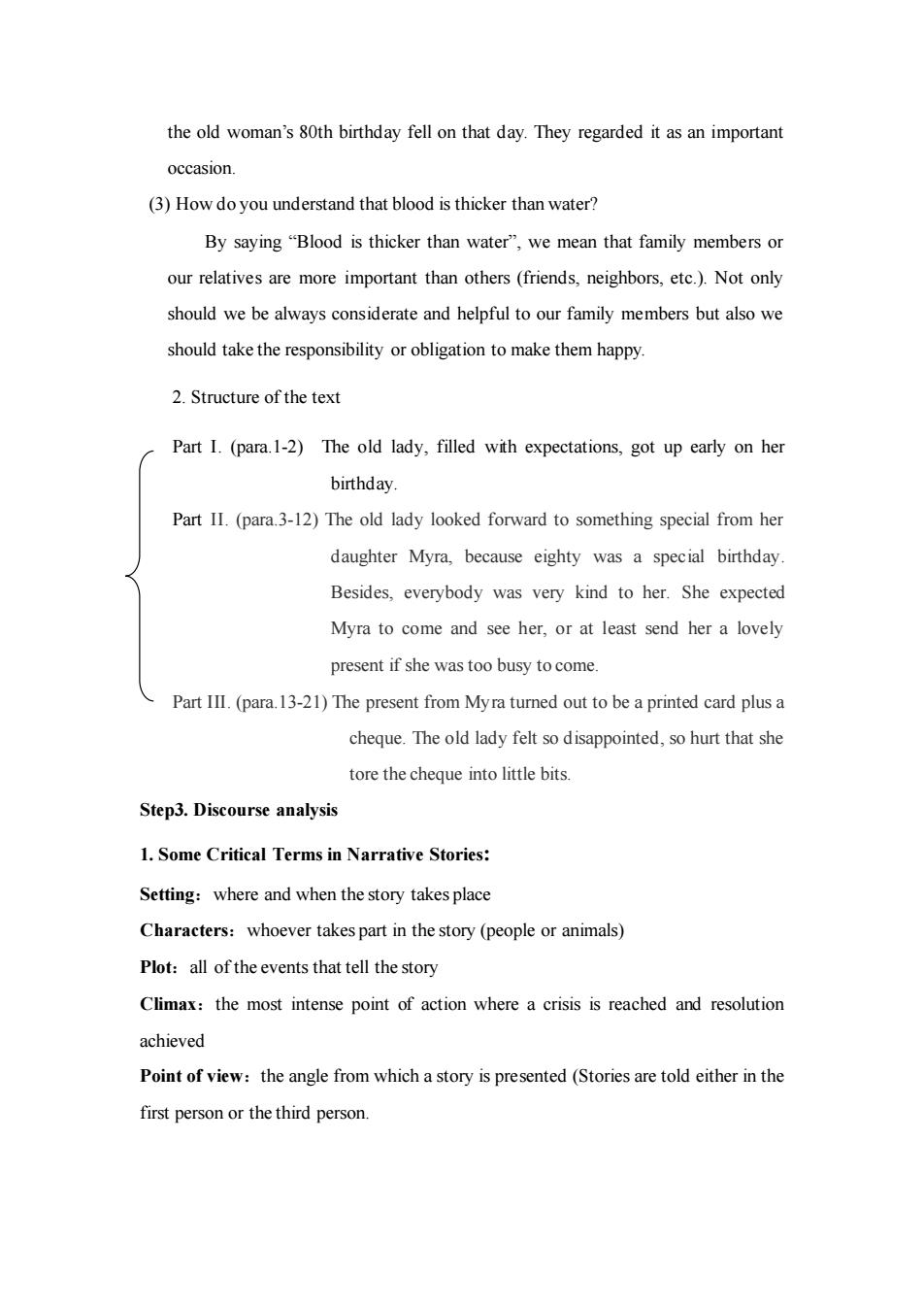
the old woman's 80th birthday fell on that day.They regarded it as an important occasion. (3)How do you understand that blood is thicker than water? By saying "Blood is thicker than water",we mean that family members or our relatives are more important than others (friends,neighbors,ete.).Not only should we be always considerate and helpful to our family members but also we should take the responsibility or obligation to make them happy. 2.Structure of the text Part I.(para.1-2)The old lady,filled with expectations,got up early on her birthday. Part II.(para.3-12)The old lady looked forward to something special from her daughter Myra,because eighty was a special birthday Besides,everybody was very kind to her.She expected Myra to come and see her,or at least send her a lovely present if she was too busy to come. Part III.(para.13-21)The present from Myra tured out to be a printed card plus a cheque.The old lady felt so disappointed,so hurt that she tore the cheque into little bits. Step3.Discourse analysis 1.Some Critical Terms in Narrative Stories: Setting:where and when the story takesplace Characters:whoever takes part in the story (people or animals) Plot:all of theevents that tell the story Climax:the most intense point of action where a crisis is reached and resolution achieved Point of view:the angle from which a story is presented(Stories are told either in the first person or the third person
the old woman’s 80th birthday fell on that day. They regarded it as an important occasion. (3) How do you understand that blood is thicker than water? By saying “Blood is thicker than water”, we mean that family members or our relatives are more important than others (friends, neighbors, etc.). Not only should we be always considerate and helpful to our family members but also we should take the responsibility or obligation to make them happy. 2. Structure of the text Part I. (para.1-2) The old lady, filled with expectations, got up early on her birthday. Part II. (para.3-12) The old lady looked forward to something special from her daughter Myra, because eighty was a special birthday. Besides, everybody was very kind to her. She expected Myra to come and see her, or at least send her a lovely present if she was too busy to come. Part III. (para.13-21) The present from Myra turned out to be a printed card plus a cheque. The old lady felt so disappointed, so hurt that she tore the cheque into little bits. Step3. Discourse analysis 1. Some Critical Terms in Narrative Stories: Setting:where and when the story takes place Characters:whoever takes part in the story (people or animals) Plot:all of the events that tell the story Climax:the most intense point of action where a crisis is reached and resolution achieved Point of view:the angle from which a story is presented (Stories are told either in the first person or the third person
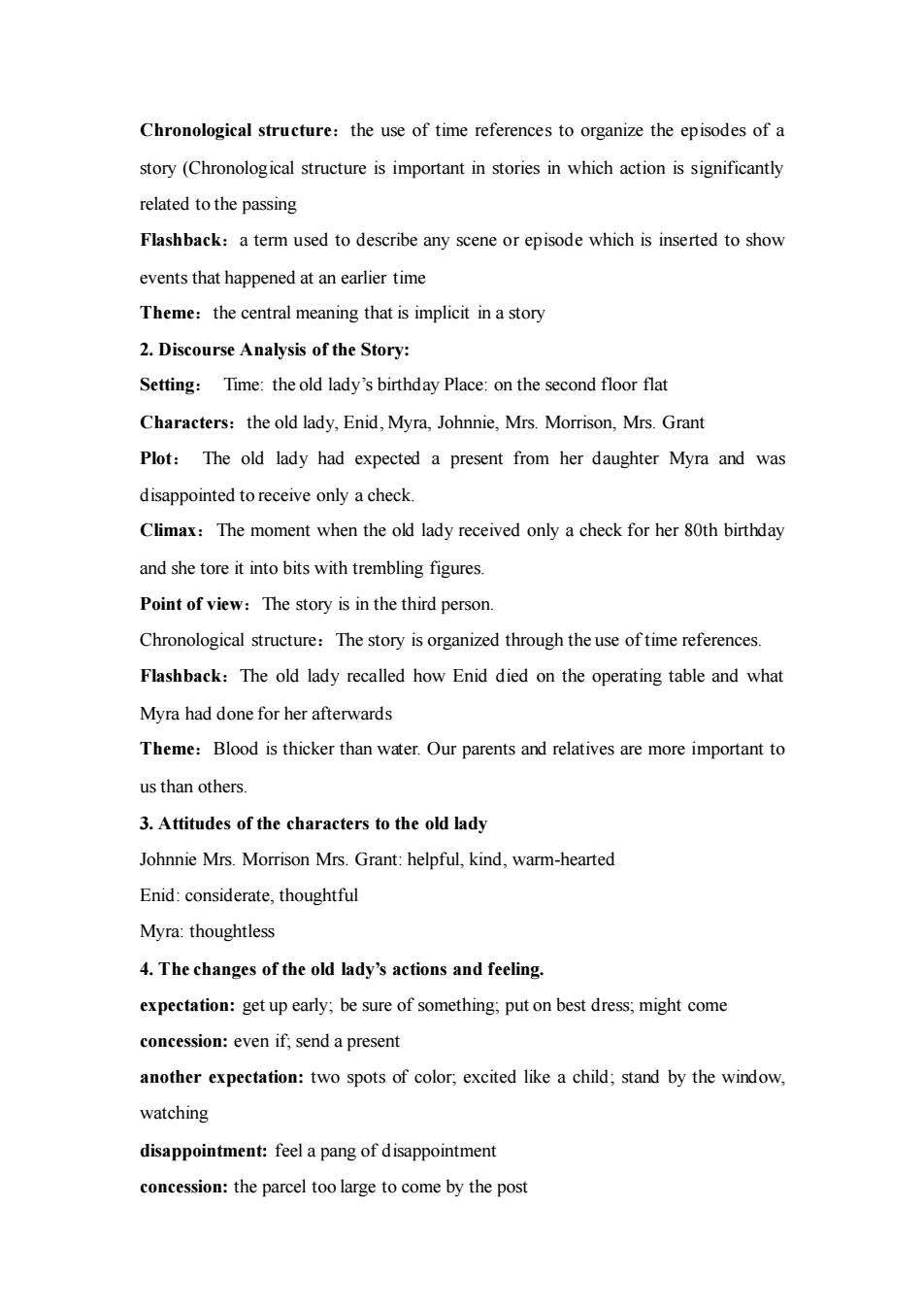
Chronological structure:the use of time references to organize the episodes of a story (Chronological structure is important in stories in which action is significantly related to the passing Flashback:a term used to describe any scene or episode which is inserted to show events that happened at an earlier time Theme:the central meaning that is implicit in a story 2.Discourse Analysis of the Story: Setting:Time:theold lady's birthday Place:on the second floor flat Characters:the old lady,Enid,Myra,Johnnie,Mrs.Morrison,Mrs.Grant Plot:The old lady had expected a present from her daughter Myra and was disappointed to receive only a check Climax:The moment when the old lady received only a check for her 80th birthday and she tore it into bits with trembling figures. Point of view:The story is in the third person Chronological structure:The story is organized through the use oftime references. Flashback:The old lady recalled how Enid died on the operating table and what Myra had done for her afterwards Theme:Blood is thicker than water.Our parents and relatives are more important to us than others. 3.Attitudes of the characters to the old lady Johnnie Mrs.Morrison Mrs.Grant:helpful,kind,warm-hearted Enid:considerate,thoughtful Myra:thoughtless 4.The changes of the old lady's actions and feeling. expectation:get up early;be sure of something,put on best dress,might come concession:even if;send a present another expectation:two spots of color,excited like a child;stand by the window. watching disappointment:feel a pang of disappointment concession:the parcel too large to come by the post
Chronological structure:the use of time references to organize the episodes of a story (Chronological structure is important in stories in which action is significantly related to the passing Flashback:a term used to describe any scene or episode which is inserted to show events that happened at an earlier time Theme:the central meaning that is implicit in a story 2. Discourse Analysis of the Story: Setting: Time: the old lady’s birthday Place: on the second floor flat Characters:the old lady, Enid, Myra, Johnnie, Mrs. Morrison, Mrs. Grant Plot: The old lady had expected a present from her daughter Myra and was disappointed to receive only a check. Climax:The moment when the old lady received only a check for her 80th birthday and she tore it into bits with trembling figures. Point of view:The story is in the third person. Chronological structure:The story is organized through the use of time references. Flashback:The old lady recalled how Enid died on the operating table and what Myra had done for her afterwards Theme:Blood is thicker than water. Our parents and relatives are more important to us than others. 3. Attitudes of the characters to the old lady Johnnie Mrs. Morrison Mrs. Grant: helpful, kind, warm-hearted Enid: considerate, thoughtful Myra: thoughtless 4. The changes of the old lady’s actions and feeling. expectation: get up early; be sure of something; put on best dress; might come concession: even if; send a present another expectation: two spots of color; excited like a child; stand by the window, watching disappointment: feel a pang of disappointment concession: the parcel too large to come by the post